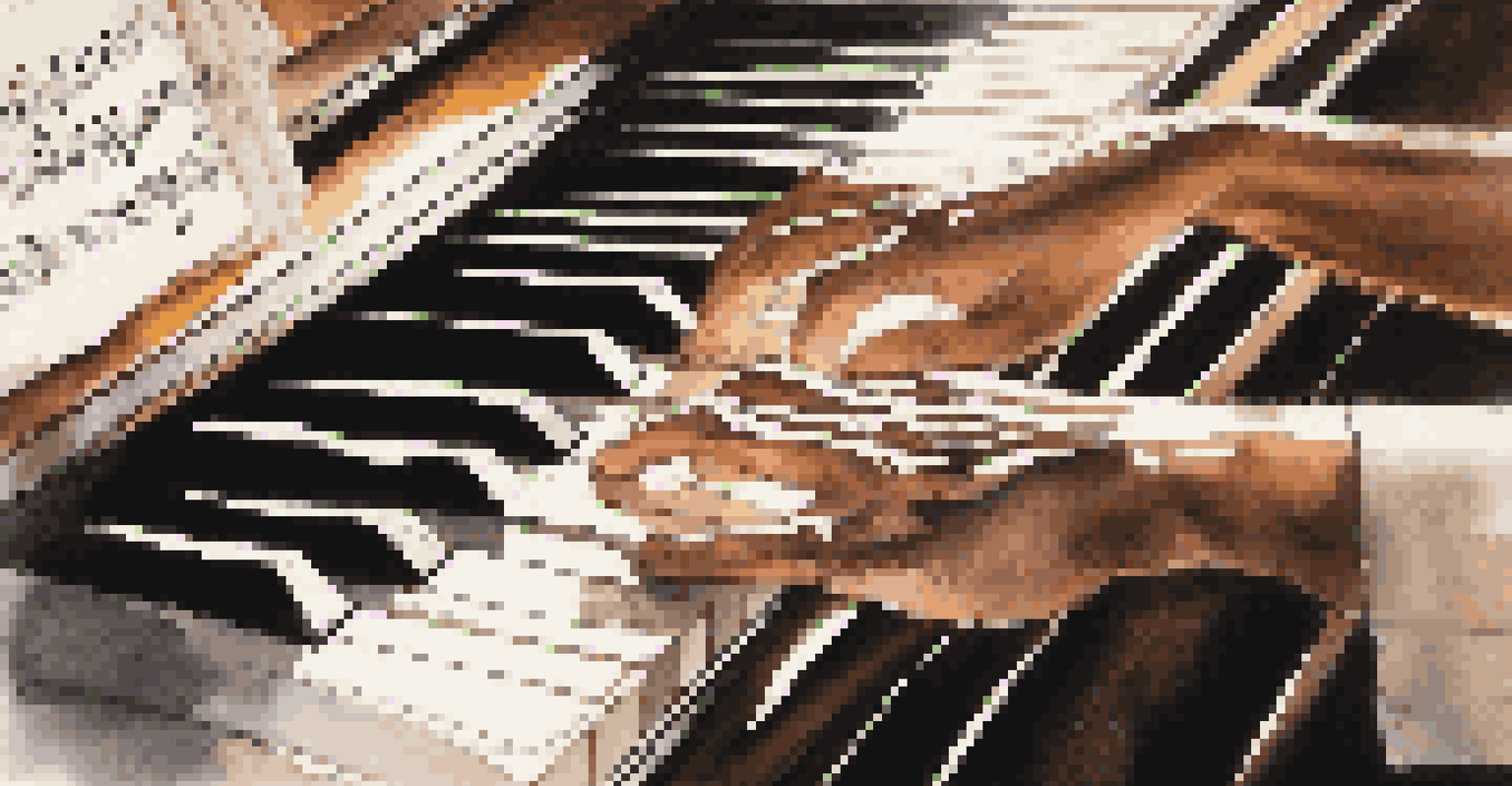Coping Through Composition: Writing Music During Crisis

The Healing Power of Music in Difficult Times
Music has long been recognized as a powerful tool for healing, especially during challenging moments. When words fail, melodies often step in to express what we can't articulate. Composing music allows individuals to channel their emotions creatively, transforming pain into something beautiful and relatable.
Music can change the world because it can change people.
For many, the act of writing music can serve as a therapeutic outlet, offering a sense of control when life feels chaotic. This process not only aids in emotional release but also helps in processing complex feelings and experiences. It’s like having a trusted friend who listens without judgment, allowing for a deeper understanding of one’s own emotions.
Through composition, musicians can create a narrative that resonates both with themselves and others facing similar struggles. This shared experience fosters connection and empathy, reminding us that we are not alone in our feelings. Ultimately, music becomes a bridge, connecting us to our inner selves and to one another.
Finding Inspiration Amidst Chaos
In times of crisis, finding inspiration can feel daunting. However, many artists discover that their most profound work emerges from moments of turmoil. The chaos around us can serve as a powerful muse, urging us to explore the deeper layers of our feelings and experiences.

For instance, consider how many iconic songs were born from personal struggles or societal issues. Artists like Adele have transformed heartbreak into chart-topping anthems that resonate with millions. This ability to find beauty in pain not only fuels creativity but also offers solace to those who listen.
Music as a Healing Tool
Music serves as a powerful means of emotional expression and connection during difficult times.
By embracing the chaos and allowing it to inform our compositions, we can create art that is not only meaningful but also deeply impactful. This process encourages us to look beyond the surface and capture the raw, unfiltered emotions that often accompany difficult times.
Techniques for Composing During Troubling Times
When it comes to composing music during crises, specific techniques can help harness emotions effectively. One method is free writing, where you jot down thoughts and feelings without worrying about structure. This practice can serve as a foundation for lyrics or themes, allowing you to explore your emotional landscape freely.
Where words fail, music speaks.
Another technique involves using improvisation to let your emotions flow through your instrument. This spontaneous approach can lead to unexpected melodies that capture your current state of mind. It’s like having a conversation with your instrument, expressing what you may not be able to say with words.
Finally, consider collaborating with other musicians or songwriters. Sharing experiences and perspectives can inspire new ideas and provide a sense of community during difficult times. This collaborative process often leads to rich, multifaceted compositions that reflect a shared experience of resilience.
The Role of Lyrics in Emotional Expression
Lyrics play a significant role in conveying emotions and stories in music. When writing during a crisis, the words you choose can encapsulate your feelings in a way that resonates with others. Crafting lyrics that reflect your personal experience can help both you and your audience process complex emotions together.
For example, think of the power of a simple line that captures a shared feeling of loss or hope. This connection can be profound, making listeners feel seen and understood. The right lyrics can become anthems for healing, reminding us that we are not alone in our struggles.
Inspiration from Chaos
Artists often find that their most profound work emerges from the turmoil surrounding them.
Moreover, lyrics can serve as a narrative tool, providing context and depth to the music. By weaving personal stories into your compositions, you create a tapestry of shared human experiences that can inspire and uplift others navigating their own challenges.
Using Music as a Form of Reflection
Composing music during a crisis allows for a unique form of reflection. It creates a space where you can examine your thoughts and feelings, leading to greater self-awareness. This introspective journey can be incredibly healing, as music becomes a mirror reflecting your inner world.
For many, songwriting serves as a way to process events that might feel overwhelming. By putting these experiences into music, you can gain clarity and insight into your emotions. It’s as if the act of creating gives you permission to feel and explore what you might otherwise suppress.
Additionally, revisiting your compositions over time can reveal how your feelings and perspectives have evolved. This ongoing dialogue with your music can foster personal growth and resilience, helping you navigate future challenges with greater strength.
Sharing Your Music as a Form of Connection
Once you've composed your music, sharing it can deepen the healing process. Whether through live performances, social media, or recording, sharing your work allows others to connect with your story. This act not only validates your experience but also encourages others to embrace their own emotions.
Moreover, when people hear your music, they often find solace in knowing someone else has faced similar struggles. This sense of community can be incredibly powerful, fostering a network of support and understanding. Your music becomes a voice for those who may feel silenced by their own crises.
Sharing Music Fosters Connection
Sharing composed music creates a sense of community and support, allowing others to relate to similar struggles.
By opening up and sharing your compositions, you create a space for dialogue about mental health and emotional well-being. This transparency can inspire others to express themselves through music, promoting a culture of healing and compassion.
The Lasting Impact of Music in Times of Crisis
The impact of writing music during crises can extend far beyond the moment of creation. Composed pieces can become anthems of resilience, inspiring others long after they were written. This enduring quality of music highlights its ability to connect people across time and space.
For many artists, their crisis-inspired compositions serve as a reminder of their strength and growth. Revisiting these pieces can evoke memories of struggle but also of triumph, reinforcing the notion that healing is a continuous journey. It’s a testament to the power of creativity in overcoming life’s challenges.

Ultimately, the music you create during difficult times can leave a legacy of hope and understanding. By sharing your journey through composition, you contribute to a collective narrative that encourages healing and connection, proving that even in our darkest moments, there is beauty to be found.